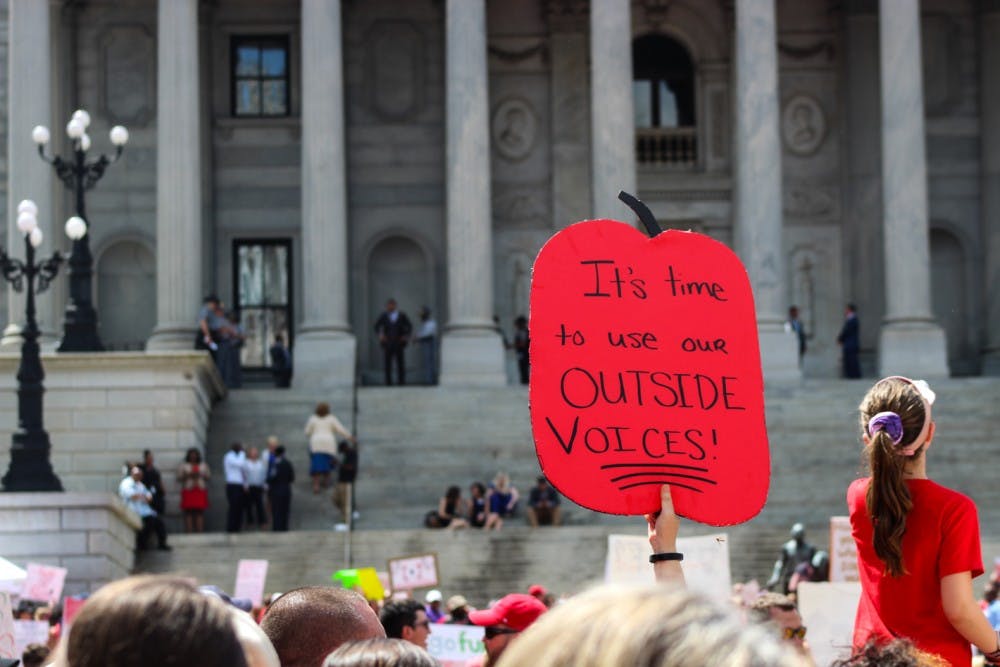The largest rally on South Carolina Statehouse grounds since the 2015 removal of the Confederate flag took place Wednesday morning — about 10,000 people showed out to protest the state's education system.
Teachers from across the Palmetto State took a personal leave day to participate in a walkout to call for smaller class sizes, higher pay and better mental healthcare and counseling for students.
A sea of red shirts worn in solidarity with teachers flooded the capitol. Teachers, professors and their families, friends and supporters rallied against underfunding and possible privatization of schools.
"It's not about me and my salary at all," said Stephanie Mignones, a German teacher at Wando High School in Charleston County.
Mignones said she's privileged to have the support of administrators and to have students whose parents support them. She looks to use that privilege, she said, to speak up for other educators.
"Every teacher in this entire state should have those working conditions and the salary that it took me 30 years to work up to," she said. "It's just the basics."
The event is not a strike — organizers of the walkout described the event as a Day of Reflection. Teachers took a personal leave day and will return to work Thursday.
South Carolina teachers have worn red on Wednesdays all year, according to The Charleston Post and Courier, as well as at legislative hearings about education. The National Education Association joined in for its "Red for Ed" campaign.
Teachers make an average of about $50,200 a year in South Carolina according to the NEA. The national average is about $60,500, putting the state's ranking at No. 40. The low pay is a contributing factor to teachers quitting their jobs in increasing numbers.
Rep. JA Moore, D-Berkeley and Charleston, said he is from a family of educators — his mother, sisters and niece have all taught. Moore came out Wednesday in support of the protesters.
"It's the right thing to do," he said, "and I've seen firsthand all of the hard work that they do for our kids."
Moore said his first priority is to fight for public education.
Other state lawmakers have come out against the protests. Gov. Henry McMaster, Senate Majority Leader Shane Massey and State Education Superintendent Molly Spearman substituted at local schools instead of appearing at the Statehouse.
“Education is a really hard issue," Massey told the Post and Courier earlier this week. "It takes time and a lot of buy in to get it right, and we recognize that the only way you’re going to get it right is listening to the people dealing with it every day ... It doesn’t seem to be productive to firebomb the bridge that allows the conversation.”
McMaster said teachers shouldn't leave to protest, but he understands why they did and that their concerns are valid.
Protesters of all ages participated in the event which lasted several hours beginning around 9:45 a.m. The occasional chant would shake the Statehouse grounds as thousands of voices said, "I teach, I vote."
Many displayed signs with messages ranging from the straightforward, "I'm a teacher — This is all the sign my budget can afford," to the more tongue-in-cheek, "Can you hear us now?"
One person held a sign depicting actor William Daniels as the fictional Mr. Feeny. Feeny was a beloved neighbor and teacher on the 1990s sitcom "Boy Meets World," known for teaching the main characters both academic and life lessons as they grew up. The sign read: "Mr. Feeny would have fought for our kids too!"
Other signs read "Teachers just wanna have funds!" "I'd rather be teaching but this is important" and "Ugh ... I don't even know where to start!"
Walter Lee, a USC Upstate professor, donned a red T-shirt and attended the rally. Lee said he doesn't believe teachers are only calling for higher pay or smaller classes — there is much more to learn about what teachers experience firsthand.
"I think a large part of this comes from the inability to change, the amount of work it would take to change, and the amount of people that would have to be at the table in order for change to occur," Lee said. "Voices need to be heard, and these people feel as though their voices are not heard."

